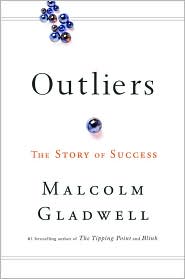I have not had the opportunity to read for pleasure in a long time. For the holidays, luckily, I was able to find enough of it to read Outliers: The Story of Success by Malcolm Gladwell, New Yorker columnist and author of two bestsellers Tipping Point and Blink.
Outliers is itself an outlier, fast becoming a story of success. Gladwell presents fascinating vignettes of people and groups of people who have achieved success ostensibly through their own sheer grit and merit. But then he questions whether their own merit and hard work are the only factors that led to their success. Or whether they were ricipients of advantages of what Gladwell calls “hidden opportunities.”
For example, Gladwell looks into why the top Canadian hockey players are overwhelmingly born in January, February, and March. Of course these players are gifted, talented, hard working, etc. But is there another explanation, some hidden opportunity that the hockey stars had?
Apparently, the elite Canadian youth hockey leagues begin at 10 years old and the registration date is January 1st. So if you are born after January 1st, and the closer your birthdate is to January 1st, the more physically and mentally mature you’ll be by January 1st of the following year relative to your league competitors.
For instance, Wayne Gretzky, no doubt an outlier in major league hockey, was born on January 26. He was 9 years old on January 1st (making him ineligible for the elite hockey league), but 25 days later he turned 10 years old. So by January 1st of the following year (when he was eligible), Gretzky was physically and mentally more mature than the other 10 year olds in the elite youth league, because he was only 25 days away from turning 11. Thanks to his relatively higher maturity, Gretzky excelled at every stage in Canada’s pyramidal youth hockey leagues. And because he excelled, he received more attention by the coaches and his parents. Ultimately, Gretzky got swept up by a cycle that honed his hockey play and hoisted him to the top of the Canadian hockey pyramid.
These hidden opportunities are also found in many elite youth soccer leagues in Europe which have registration dates of August 1st. As you can imagine, many of the top European soccer stars have birthdates immediately following August 1st.
Another vignette that I found fascinating was Gladwell’s look into why Asians are outliers in math. Is it because Asians are simply innately smarter? (As an Asian myself, I liked to think so.) Not so. Instead, Gladwell suggests that Asian languages (and so too Hebrew) treat numbers in an uninterrupted logical manner which makes it easier for young children to grasp numbers.
For example, in Korean, eleven is literally translated to mean ten-one, twelve is ten-two, thirteen is ten-three, and etc. Moreover, twenty is two-ten, thirty is three-ten, and etc. Any non-Korean reader of an IQ of 80 or higher can probably figure out the Korean number system with the two examples I’ve presented. And there is the key: expectancy. Logic creates expectancy and understanding. In turn, Asian children become more comfortable with numbers and they can memorize numbers quicker and retain them longer.
Like the hockey example, a higher comfort level with numbers at early ages begins a cycle of learning and enjoyment with subjects involving numbers. And when you are comforable and creative with numbers, you tend to be more diligent in solving mathematical problems and equations. Fast forward twenty years to college and graduate levels, Asians have a distinct advantage in math.
Gladwell concludes each story with suggestions on how we can improve our education system and our society in general by focusing on these hidden opportunities. I will discuss these suggestions in a later post.
Of course as with many other books that suggest different causes for particular effects , you can think of other examples that cause the effects, which I gather is the point. Gladwell does an excellent job in making the reader think, question, and challenge conventional wisdom.
